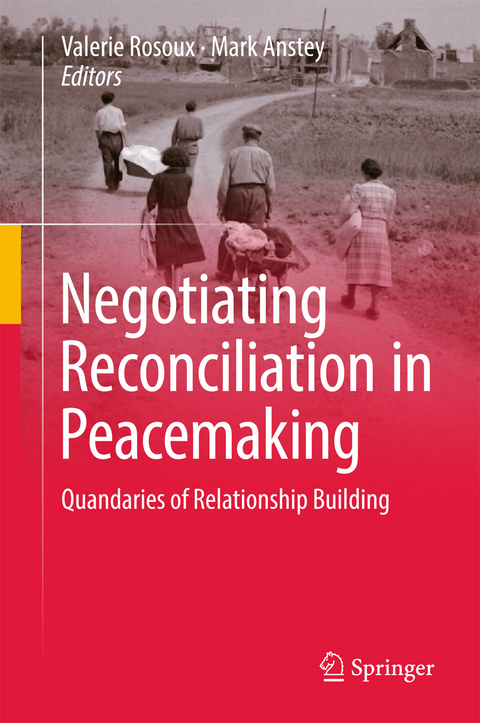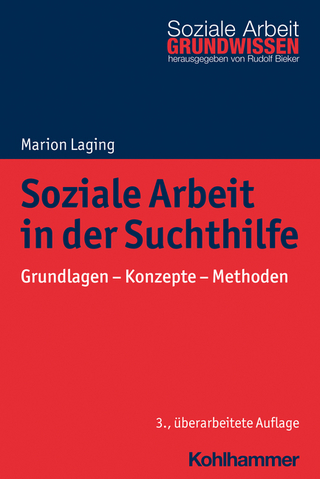
Negotiating Reconciliation in Peacemaking
Springer International Publishing (Verlag)
978-3-319-62673-4 (ISBN)
Contributions to the book reveal some of the complexities of national and international reconciliation projects, but particularly diverse understandings of reconciliation and how to achieve it. All conflicts reflect unique dynamics, aspirations and power realities. It is precisely because parties in conflict differ in expectations of reconciliation outcomes that its processes should be negotiated. This book is a valuable resource for both scholars and practitioners engaged in resolving conflicts and transforming fragmented relations in conflict and post-conflict situations.
Valerie Rosoux has a Licence in Philosophy and a Ph.D. in International Relations. She is a senior research fellow at the Belgian National Fund for Scientific Research (FNRS) and a Senior Visiting Fellow of Clingendael, the Netherlands Institute of International Relations. She teaches International Negotiation, and Conflict Transformation at the University of Louvain (UCL). In 2010-2011, she was a Jennings Randoph Fellow Senior Fellow at the United States Institute of Peace (Washington DC). As a post-doctoral researcher, she worked at the Johns Hopkins University School of Advanced International Studies (SAIS) in 2002, the Center for International Studies and Research (CERI), Institut d'Études Politiques of Paris (2001) and the University Laval, Canada (2000). Her research interests focus on transitional justice, post-war reconciliation and the uses of memory in international relations. Since 2016, she is a member of the Belgian Royal Academy. Mark Anstey (D Phil) is an Emeritus Professor of Nelson Mandela Metropolitan University and a Senior Visiting Fellow of Clingendael, the Netherlands Institute of International Relations. He was a Professor with Michigan State University in Dubai (2008-11), and has taught at the Universities of the Witwatersrand, Cape Town, and Stellenbosch. An active labor and community mediator since 1984, he served on South Africa's peace structures during the political transition period, and was Director of Monitoring (Eastern Cape) for the Independent Electoral Commission in the country's historic 1994 elections. He has particular interest in relationship building interventions in places of work. He is active in post-graduate teaching and is the author of seven books and numerous publications in academic and professional journals. He has given addresses, trained and consulted across a spread of countries in Africa, Europe, the Middle East, as well as the USA.
Chapter 1. Introduction - Negotiating perilous relations: quandaries of reconciliation (Valerie Rosoux).- Chapter 2. Reconciliation as a Puzzle: Walking Among Definitions (Valerie Rosoux).- Chapter 3. Reconciliation, Morality and Moral Compromise (Rudolf Schüssler).- Chapter 4. Power, Negotiation and Reconciliation (Mark Anstey).- Chapter 5. Time and Reconciliation: Dealing with festering wounds (Valerie Rosoux).- Chapter 6. Gender and Peace Negotiations:Why Gendering Peace Negotiations Multiplies Opportunities for Reconciliation (Élise Féron).- Chapter 7. Reconciliation and Development (Mark Anstey).- Chapter 8. Rwanda: The Limits of a Negotiated Justice (Valérie Rosoux).- Chapter 9. The Refugee Issue in the Israeli-Palestinian Peace Process: The (im)Possibility of Negotiating Accountability (Laetitia Bucaille).- Chapter 10. Russian-Polish Reconciliation and Negotiation (Igor Gretskiy).- Chapter 11. Negotiating and Sharing Power: Burundi's Bumpy Road to Reconciliation without Truth (Stef Vandeginste).- Chapter 11. Security and Reconciliation: Introducing Soft Security 2.0 to Reconciliation Dynamics (Moty Cristal).- Chapter 12. Reconciliation and the Land Question in South Africa: A case for Negotiation? (Gavin Bradshaw).- Chapter 13. "When Shall We Not Forgive?" - The Israeli-German Reparations Agreement: The Interface Between Negotiation and Reconciliation (Aviv Melamud).- Chapter 14. Tensions between Short Term Outcomes and Long Term Peacebuilding in Post-war Sri Lanka (Nick Lewer).- Chapter 15. Negotiating Grassroots Reconciliation in the Context of Social Disintegration in Post-apartheid South Africa (Ruben Richard).- Chapter 16. Lessons for Theory: Reconciliation as a Constant Negotiation (Valérie Rosoux).- Chapter 17. Lessons for Practice (Mark Anstey).
| Erscheinungsdatum | 23.11.2017 |
|---|---|
| Zusatzinfo | X, 362 p. 4 illus. in color. |
| Verlagsort | Cham |
| Sprache | englisch |
| Maße | 155 x 235 mm |
| Gewicht | 744 g |
| Themenwelt | Sozialwissenschaften ► Pädagogik ► Sozialpädagogik |
| Sozialwissenschaften ► Politik / Verwaltung ► Staat / Verwaltung | |
| Sozialwissenschaften ► Soziologie | |
| Schlagworte | Applied Psychology • Central / national / federal government policies • Community and Environmental Psychology • Conflict Transformation • Development Studies • development theory • Environmentalist thought & ideology • Environmentalist thought & ideology • International Relations • International Relations Theory • Negotiation • Peacebuilding • post-conflict • Psychology • Reconciliation • Social, group or collective psychology • Social Policy • Social Sciences • society & social sciences • Society & Social Sciences • Sociology • Transitional Justice |
| ISBN-10 | 3-319-62673-6 / 3319626736 |
| ISBN-13 | 978-3-319-62673-4 / 9783319626734 |
| Zustand | Neuware |
| Haben Sie eine Frage zum Produkt? |
aus dem Bereich


